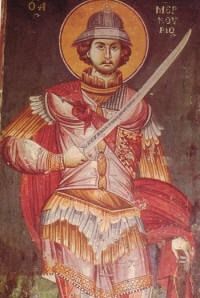Wednesday of the 4th Week of St. Luke
You can listen to an audio podcast of this post at https://www.spreaker.com/user/youngfaithradio/lk4wed-b. This recording was made two years ago, and therefore the menaion date stated is two days ahead of today’s.
In today’s Gospel, the disciples have a close brush with death and experience their complete dependence on the Master:
At that time: Jesus went into a ship with his disciples: and he said unto them, Let us go over unto the other side of the lake. And they launched forth. But as they sailed he fell asleep: and there came down a storm of wind on the lake; and they were filled with water, and were in jeopardy. And they came to him, and awoke him, saying, Master, master, we perish. Then he arose, and rebuked the wind and the raging of the water: and they ceased, and there was a calm. And he said unto them, Where is your faith? And they being afraid wondered, saying one to another, What manner of man is this! for he commandeth even the winds and water, and they obey him. – Luke 8: 22-25
St. Theophan the Recluse takes the disciples’ experience as a reminder that we should daily and hourly remember death:
When they boarded the ship to sail to the other side of the lake, did the Apostles think that they would meet with a tempest and expose their lives to danger? Meanwhile, a tempest suddenly arose and they did not expect to remain alive. Such is the path of our life! You do not know how or from where danger will sweep in, capable of destroying us. Air, water, fire, beasts, man, a bird, a house – in a word, everything around us – could suddenly be transformed into a weapon for our death. From this comes a law: live in such a way that every minute you are ready to meet death, and fearlessly enter into its realm. This minute you are alive, but who knows whether you will be alive the next? Keep yourself according to this thought. Do everything you have to, according to the routines of your life, but in no way forget that you could immediately move to a land from which there is no return. Not remembering this will not postpone the appointed hour, and deliberately banishing this crucial change from your thoughts will not lessen the eternal meaning of what will happen after it. Commit your life and everything in it into God’s hands. Spend hour after hour with the thought that each hour is the last. From this the number of empty pleasures will decrease, while at death this deprivation will be immeasurably recompensed with a joy that has no equal among the joys of life. – Thoughts for Each Day of the Year, pp. 226-227
Recall that all of our spiritual problems come from pride, which is essentially the primordial delusion that we are in charge of everything, the source of our own existence, and that somehow we can preserve ourselves indefinitely if only we are clever and powerful enough. We forget that we have a Creator, that we are entirely contingent beings, and that without His upholding us in existence we would return immediately to the abyss of non-being from which we came. Are you 15, 45, 75, 105 years old? Looking back to the time of your coming into being, that number of years plus nine months is all that separates you from the realm of absolute non-existence. Now put that number of years next to the 7,000+ years of the earth’s history. Put it next to the immeasurably vast aeons of the angelic universe. Put it next to eternity. Think about it.
One mark of the spiritual poverty of contemporary Christianity is that the most fundamental spiritual exercises known to our forebears, including the unlettered ones, have become utterly foreign to us. One of these essential practices is the constant remembrance of death. For the Christian, this does not produce gloom and depression but rather the opposite: joy, spiritual freedom, and hope in the life to come; not, however, without sobriety regarding one’s spiritual state and constantly striving in repentance, abiding in humble self-reproach.
The constant remembrance of death, yoked with a pure conscience, opens the inexhaustible wellspring of courage, a virtue noticeably absent from Christian life today. Everyone grows calculating and cold, holding something back; it is rare to see the childlike, self-forgetting zeal of the martyrs and ascetics of old, to see a David dancing before the Ark or a Peter impulsively setting out to walk on the water. Our fathers of old were kings, warriors, monks, scholars, artists, craftsmen, and rugged men of the wilderness and of the soil, while we have become gadget minders, money-counters, clock-punchers, paper-pushers, and screen-watchers. This cosseted artificial life creates an illusion of comfort and even immortality; we forget that only a life lived as an adventure full of risk is worth living, and that the final adventure of death awaits every man, whether he be hero or coward. We shall die nonetheless.
We cannot change our circumstances, at least not much. But we can change ourselves. Let us be warriors of the spirit, forgetting our absurd egotistical demands for guaranteed security, comfort, and entertainment, and setting out on the beautiful adventure of knights errant for Christ. Remembering death at every moment, let us scorn the illusion of happiness promised by the usurious elite and their technocratic hirelings to their slaves, the mindless thumb-suckers and hollow men of the New Normal, and let us freely confess our Faith, practice the virtues, and rejoice in being regarded as fools by the world. We have nothing permanent to lose, except for an eternity in hell with Satan and his angels. We have everything permanent to gain: eternal rejoicing at the victory banquet of our Mighty Warrior and Victorious King.

